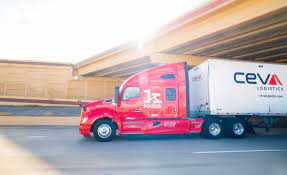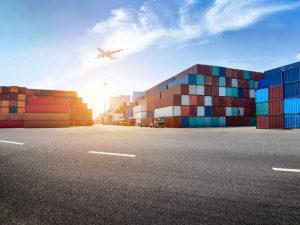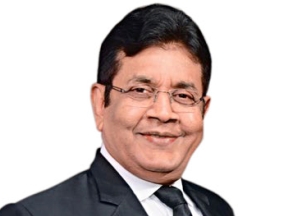CEVA Logistics is transitioning all its contract logistics and freight services to low-carbon electricity by 2025. “The commitment will rely on a combination of purchasing low-carbon electricity (renewable and nuclear) from local utility providers and increasing its own production of electricity using rooftop solar panels, which the company will triple by the end of 2025,” said an official release. “In addition, CEVA expects to reach 100 percent LED lighting in its warehousing facilities by the end of 2023.” CEVA finished 2022 with LED lighting in approximately 80 percent of its contract logistics warehouses, the release said. CEVA is also increasing the size of its lithium-ion material handling equipment (MHE) fleet. “The global logistics provider expects its global fleet to reach a 40 percent level in 2023 of eco-MHE (lithium-ion and gel battery units). Beyond the obvious emissions savings in moving away from diesel- or LPG-powered combustion MHE, the company is also seeing an average 16 percent emissions reduction during the charging process when switching from a lead-acid battery MHE to more eco-friendly lithium-ion batteries.” Through a joint investment with real estate partners of approximately $180 million, CEVA plans to triple the surface area of solar panels covering the roofs of its contract logistics warehouses around the world, the release said. “By the end of 2025, the company expects to have approximately 1.8 million square metres of solar panels installed at its facilities — an area 2.25 times the size of France’s famed Palace of Versailles. With this coverage area, the company estimates it will generate approximately 135,000 MWH per year.”
Read More »Air and sea logistics centre in Guangzhou Airport to expand ops
China’s Cosco Shipping has opened a sea and air logistics centre in Guangzhou Airport’s economic zone to expand global operations. The facility is to include warehousing, logistics, e-commerce and other value-added services, said a statement. Its opening marks the start of the Shanghai-headquartered company’s regional supply chain platform in southeast China. Cosco Shipping Logistics chairman Han Jun said: “This logistics park applies [a] smart management system, which can make the best use of visualisation, digitalisation and intelligent technology to build a safe, convenient, efficient and green park. “This project is in line with the national Great Bay Area development strategy and we will increase investments in core resources and accelerate upgrading [to create an] integrated logistics supply chain.” CMA CGM, Maersk and Mediterranean Shipping Company (MSC) have all invested aircraft or entered partnerships to develop their own cargo airlines. CMA CGM Air Cargo is partnering with Air France-KLM and recently launched flights to Shanghai. Maersk has bought and leased aircraft, purchased freight forwarder Senator International (rebranded as Maersk Air Freight) and set up a subsidiary airline, Maersk Air Cargo, which began operations in October 2022. Atlas Air took delivery in November 2022 of the first Boeing B777-200 freighter that it will operate on behalf of MSC.
Read More »CJ Darcl partners with Netradyne to enhance fleet safety
CJ Darcl Logistics Ltd, has partnered with Netradyne, a SaaS leader in artificial intelligence to provide advanced fleet safety solutions. The engagement provides fleet of 1000 vehicles of CJ Darcl with AI-enabled embedded safety technology, helping the company improve fleet operation performance, driver behavior, and reduce thefts. By deploying Netradyne’s Driver•i, CJ Darcl Logistics enhances their fleet management and further builds upon cost-effective services and sets new safety standards. The Driver•i system helps the company achieve its goals of improving driving behavior through automated driver coaching. It also supports in expediting driver exonerations as well as in handling insurance claims. Durgadutt Nedungadi, Vice President – International Business, Netradyne, said, “We are thrilled to partner with CJ Darcl Logistics, and we will deliver our industry-leading AI-based safety technology solutions to its fleets. The partnership paves the way for us to showcase our technology’s flexibility to cater to our customers’ diverse needs.” Nikhil Agarwal, President- CJ Darcl Logistics Ltd said, “Our vision is to train and to make the drivers follow the best road practices to avoid accidents. CJ Darcl aims to accomplish zero accidents and to understand and address the areas of concern while driving. Partnering with Netradyne’s Driver•i with smart safety dash cams will help to control the driver’s distracted sight. We have also conducted certain trials. Hence, it is helping in maintaining the Driver’s scorecard with other promising results.”
Read More »GoGreen Plus launched to enhance sustainability cargo ops
DHL Express has launched GoGreen Plus, a new service that will allow customers to reduce (‘inset’) the carbon emissions associated with their shipments through the use of Sustainable Aviation Fuel (SAF). This is a first for global express carriers, and will initially launch in the UK, shortly followed by Italy, Denmark, Sweden, Canada, Australia, South Africa, and the United Arab Emirates. Starting this month, customers based in these countries will have the option to select GoGreen Plus when choosing their shipping service through MyDHL+, the company’s online shipping and tracking platform. The service is designed to be fully flexible as it can be selected for individual shipments. GoGreen Plus will become available to all DHL Express customers globally over the coming months, with customers being given the chance to tailor the CO2e reduction they want to achieve and the amount of SAF they use. The new GoGreen Plus service is made possible following DHL’s recent collaborations with bp and Neste to supply SAF to DHL Express hubs around the world. The renewable part of the innovative fuel is produced from waste oils. Such SAF from wastes and residues can provide greenhouse gas emission reductions of up to 80 per cent over its lifecycle compared with the conventional jet fuel it replaces. John Pearson, CEO DHL Express, says: “We know our customers are committed to reducing their environmental impact so it’s important we’re giving them the means to do so. I’m delighted that our investment in SAF can now be fully leveraged by customers to enable them to bring down the emissions of their shipments. SAF is currently the primary route to reducing carbon emissions in aviation, so this is the …
Read More »Shankar Shinde elected as Chairman, IFCBA
FFFAI Chairman, Shankar Shinde has been unanimously elected as Chairman of the International Federation of Customs Brokers Associations (IFCBA) during its Board of Directors’ Annual General Meeting held recently. Shinde is currently Chairman of the Federation of Freight Forwarders Associations in India (FFFAI) and earlier was holding the post of Managing Director of IFCBA. FFFAI as an Apex body of Customs Brokers in India plays a pivotal role in customs clearance on cross border, recommending best practices in International Exim trade. Other Members elected to the Board of Directors of IFCBA are Secretary General- Ms Carol West from Canada and six Managing Directors: Mr Clive Coke from Jamaica, Ms Angela Collin from Canada, Mr Paul Damkjaer from Australia, Mr Bai Fengchuan from China, Mr Seisaku Okafuji from Japan and Ms Kristiann App from the United States of America. It is pertinent to mention that IFCBA chairs the Private Sector Consultative Group (PSCG) of World Customs Organisation (WCO). Commenting on his focus area as FIATA Chairman, Mr Shinde said that with the WCO theme “Nurturing the next generation: promoting a culture of knowledge-sharing and professional pride in Customs”, which was launched on International customs Day, IFCBA would be happy to carry forward the implementation of this theme to benefit and promote professionalism in the trade.
Read More »Multimodal connectivity will improve growth
JB Singh, Director MOVIN said, “The budget is in line with the government’s long-term goal of having a successful and integrated logistics industry. This industry will be more competitive with this budget. The effective multimodal connectivity initiative will act as a catalyst for the overall sector’s improvement. Logistics is established as a major economic pillar by the government’s emphasis on the railway infrastructure and crucial transport projects for first and last-mile delivery of the specified sectors. Additionally, the emphasis on upskilling people and the introduction of the digital infrastructure will lead to more young employment in this sector, establishing a complete ecosystem. This would help in lowering the cost of logistics while also facilitating trade and bringing India into compliance with international standards.”
Read More »Budget will resolve supply chain inefficiencies
Raaja Kanwar, Chairman and Managing Director, Apollo Supply Chain and Apollo International Limited share his views on the Union Budget 2023, he said, “The Union Budget 2023 lays out a credible roadmap towards the development of transport infrastructure and last-mile connectivity. We congratulate the budget for making Green Growth one of the top 7 priorities; focusing on ease of doing business. As, Apollo Supply chain, we look forward to resolving the inefficiencies in the country’s supply chain.”
Read More »‘Budget should focus on lowering logistics costs’
Citing his expectations from the budget, Mahendra Shah, Chairman, and Group Managing Director, V-Trans (India) Ltd said, “In the impending budget, The finance minister can address the challenges faced by the logistics sector in several ways and provide a steadiness between the economic growth priorities and inflation concerns, in an all-encompassing manner. Investments in infrastructure and technology can be given some motivation by offering tax benefits, it will on hand make the operations more effective and bring down the cost, on the other, it will also create employment opportunities. Also, to motivate the logistics players, the government can enhance or introduce rewards for building green infrastructure and practicing sustainable initiative”. Further he added, “The momentum of growth that our country has come to a way post the global pandemic cannot be undermined, the strengthening of the digital ecosystem with various initiatives under NLP, for faster communication and work, enhanced visibility, and transparency is very promising. To catalyze the master plan announced in the previous financial budget, NLP was much awaited by the industry and heard quite applause. We expect this budget to focus on lowering the costs of the logistics industry, especially by implementing the NLP that was launched in 2022, and look forward to seeing some tangible benefits to the industry being passed.”
Read More »“Govt should focus on NLP, tech & sustainability’
Sharing his expectations from the upcoming budget, Malay Shankar, CEO, ProConnect Supply Chain Solutions Ltd says, “In the post-pandemic reality, the logistics sector has been flourishing, contributing immensely to the national economic growth. Since the Indian government focuses on accelerating economic development, strategic announcements and changes for Supply Chain and Logistics Industry will have a wide-spreading impact. Here are some of the sector’s expectations from the government to fast-track the economy’s productivity. Firstly, the New Labour Code directly impacts the blue-collar workers who are the backbone of the logistics and supply chain industry. Bringing in more straightforward means of enforcing it, while ensuring social security and economic benefit to the blue-collar workers will fetch long-lasting results. Getting rid of ambiguity and having simpler ways of implementation will help industrial workers. Coupled with the supportive Digital India policies, the government can thrust on closing the digital gap that persists in the industry. With lucrative sops for players bridging this gap by skill training to their workforce, the government can boost leaders in the space to catalyse the digital evolution of the sector.” He adds, “On the other hand, we really hope the government will strengthen the foundation of National Logistics Policy (NLP) and implement it to ease bottlenecks and reduce costs. Along with that, an improved road network will decongest roads, facilitate seamless transportation of goods and get better land value for the warehousing hubs. The sector is keenly looking at adopting greener practices. Offering tax benefits and incentives to the warehousing industry for deploying solar-enabled solutions and other green practices will go a long way in reducing the carbon footprint of the sector as a whole.”
Read More »“Focus on increasing tech adoption in cold chain sector”
Industry expert, Swarup Bose, Founder & CEO of Celcius Logistics shares his expectations for the upcoming budget. He says, ” The Indian cold supply chain industry has rapidly grown, especially post-COVID. In 2021, the Indian cold chain logistics market was valued at $24.62 Billion, and it is expected to reach $53.07 Billion by 2027, growing at a CAGR of 13.66% from 2021 to 2027. However, currently, the cold supply chain sector is highly fragmented and marred with severe challenges, leading to the wastage of 40% of the over 400 million MT of perishable food! And according to the Associated Chamber of Commerce, our post-harvest losses amount to a whopping $14bn.” He adds, “While there has been a strong focus by the government on Logistics as a sector, a renewed and closer look at Cold Supply Chain would benefit in cutting losses and improving the hunger index while also empowering agriculture, food & dairy and process food sectors, along with pharma and healthcare. Listed here are a few points that, if considered in the Union Budget 2023-24, would go a long way in creating a robust, seamless and effective cold supply chain network: 1. Capital support/ FDI for technology adoption: The huge capital investment required for digital adoption in the cold supply chain sector, is a massive challenge. With provisions for FDI and capital support, it will be easier to bring in the best in tech innovations that can be applied across the cold supply chain and truly empower all stakeholders to embrace smart tech. 2. Tax holidays/ subsidies for critical Cold Storage: Temperature-controlled warehousing is an investment intensive yet one of the most crucial aspects of the cold supply chain …
Read More » Cargo Breaking News
Cargo Breaking News









